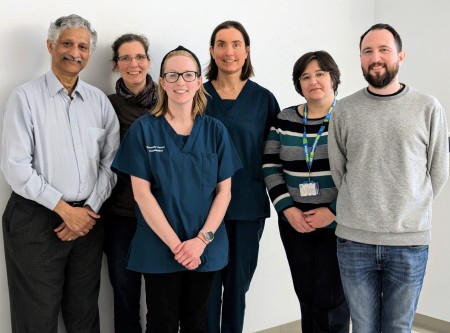Publish date: 25 August 2024
Northumbria Healthcare endorses #SASsix campaign to improve careers and retention of SAS doctors and dentists

Northumbria Healthcare NHS Foundation Trust is delighted to support the #SASsix national campaign, a roadmap for improving the careers for specialty, specialists and associate specialist (SAS) doctors and dentists, who play a key role in medical workforce.
SAS and locally employed doctors (LEDs) make up around 30% of the medical workforce, playing a vital role in the NHS. This is a skilled, diverse and motivated group of doctors: 83% of them have 10 or more years of experience in medicine.
Most SAS doctors work in senior roles in the NHS, treating and caring for thousands of patients every day, many running their own clinics and working autonomously. As patient care grows ever more complex, with new technologies and treatments, the NHS needs highly skilled, specialist doctors who can care for an ageing population with multiple chronic conditions. SAS and LEDs are absolutely essential to the NHS.
SAS and LEDs are the fastest growing part of the medical workforce, increasing by 40% between 2017 and 2021. A growing number of these doctors and dentists are motivated by wanting a more flexible career path and roles, geographical stability or a better work-life balance.
Northumbria Healthcare has more than 70 SAS doctors and dentists across all specialities and welcomes the SAS Six campaign. The trust is committed to implementing the changes proposed which include:
- Every early career SAS doctor should have access to an educational supervisor.
- All SAS doctors should have equity of access to professional development opportunities relevant to their stage of career.
- All specialty doctors who meet the required capabilities should have the opportunity to become specialists.
- Senior SAS doctors should be offered the opportunity to be educators at every level on a par with consultants, e.g., educational supervisors, clinical supervisors, directors of medical education.
- All extended roles in leadership and management should be open to all substantive medical staff, i.e., consultants and appropriately experienced SAS doctors.
- All locally employed doctors employed for more than two years within one trust should be offered the opportunity to transfer to the appropriate SAS contract.
Dr Ellen Tullo said: "My decision to become a specialty doctor at Northumbria Healthcare was a way of introducing a level of flexibility that was not possible via the standard training route. I was interested in creating more time in my job for medical education and pedagogic research and getting involved in research projects.
"Having specialty doctor status meant that I could be employed by an NHS trust as a geriatrician, and by a university as a lecturer, dividing my time between the two. I was able to undertake a PhD in medical education while working with NIHR Newcastle Biomedical Research Centre to support the academic careers of other healthcare professionals, maintaining my clinical skills at the same time."
Northumbria's SAS tutor, Dr Zoe Robertson, a specialty anaesthetist, added: "This is a great initiative to improve the careers of SAS doctors and benefit patients and the NHS as a whole. There is a wealth of talent often overlooked in SAS doctors and the #SASsix highlights the crucial role they play in delivering high-quality patient care and medical education."
The support from Northumbria Healthcare for the #SASsix has been welcomed by Dr Joanne Younge, associate specialist old age psychiatrist and SAS lead in South Eastern Health & Social Care Trust, Northern Ireland.
"The SAS Collective started as a national grassroots campaign by five SAS doctors on Twitter/X during SAS week 2023 to try to change the rhetoric of so many national papers into reality on the ground," she said. "We firmly believe that implementing the #SASsix will greatly improve the work life of SAS doctors and lead to better recruitment and retention of current and future SAS and locally employed doctors within the current medical workforce crisis, which will translate into better patient care. This is important as SAS and LED doctors will be the largest group of doctors on the GMC register by 2030.
"We are absolutely delighted that Northumbria Healthcare NHS Foundation Trust has decided to be the first UK trust to officially support their SAS doctors by implementing the #SASsix and hope that other trusts will follow that lead. The Hospital Consultants and Specialists Association, Medical Protection Society, Royal College of Physicians, Association of Anaesthetists, Royal College of Anaesthetists, Medical Education Leaders UK and Medical Women’s’ Federation have all now officially supported the #SASsix and we would like to thank all SAS doctors and our allies. You are the SAS Collective!”
